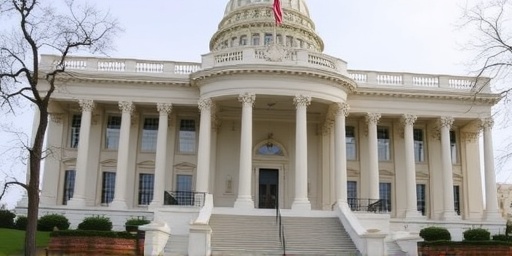Washington, D.C. – With just weeks remaining until the end of the year, Congress remains gridlocked over extending enhanced Affordable Care Act (ACA) subsidies, leaving millions of Americans on the brink of skyrocketing health insurance premiums. The impasse threatens to unravel a cornerstone of health policy that has enabled record enrollment in marketplace plans, as Republicans and Democrats clash over costs and priorities in a bitterly divided Capitol Hill.
- Enhanced ACA Subsidies Under Fire: A Timeline of Temporary Lifelines
- Partisan Battle Lines Harden in Congress Over Subsidy Costs
- Real-Life Impacts: Families Brace for Premium Shockwaves
- Experts Forecast Uninsured Crisis and Economic Ripple Effects
- Lame-Duck Session Heats Up: Bipartisan Breakthrough or Continued Standoff?
These subsidies, originally boosted under the 2021 American Rescue Plan and extended temporarily, cap monthly premiums at 8.5% of income for many families. Without renewal, experts warn premiums could surge by 75% or more starting in 2025, potentially forcing 4 million people off health insurance altogether. Enrollment in ACA marketplace plans hit a record 21.4 million for 2024, largely fueled by these subsidies, according to the Centers for Medicare & Medicaid Services (CMS).
Enhanced ACA Subsidies Under Fire: A Timeline of Temporary Lifelines
The battle over Affordable Care Act subsidies traces back to the COVID-19 pandemic, when Congress injected $65 billion into health insurance marketplaces via the American Rescue Plan Act. These enhanced premium tax credits eliminated the so-called ‘subsidy cliff,’ allowing aid for individuals earning up to 400% of the federal poverty level – roughly $58,320 for a single person in 2024.
Initially set to expire after 2022, bipartisan pressure led to a one-year extension in the Inflation Reduction Act of 2022, pushing the deadline to December 31, 2024. Now, as that date approaches, renewal talks have stalled. Senate Majority Leader Chuck Schumer (D-NY) has called the subsidies ‘the most successful health policy in a generation,’ crediting them with driving down the uninsured rate to a historic low of 7.7% last year.
Yet fiscal conservatives argue the program costs taxpayers $100 billion annually. The Congressional Budget Office (CBO) projects that letting them lapse would save $250 billion over a decade but increase uninsured numbers by 3.8 million by 2034. States like California and New York, with high ACA enrollment, face the steepest cliffs, while rural areas could see provider networks crumble under reduced coverage.
- 2021: American Rescue Plan introduces zero-premium plans for low-income enrollees.
- 2022: Enrollment jumps 40% to 14.4 million.
- 2023: Extended through IRA; 21 million enroll.
- 2024: Record 21.4 million, with average subsidies at $705 monthly per enrollee.
- Dec. 31, 2024: Current deadline, no extension in sight.
This timeline underscores how Affordable Care Act subsidies have transformed health insurance accessibility, but their temporary nature now fuels the congressional standoff.
Partisan Battle Lines Harden in Congress Over Subsidy Costs
The deadlock exemplifies deeper rifts in health policy debates. House Republicans, led by Speaker Mike Johnson (R-LA), have proposed scaling back subsidies to target only those under 250% of poverty, arguing the current structure subsidizes middle-class families unnecessarily. ‘We can’t keep borrowing from our grandchildren to pay for open-ended entitlements,’ Johnson stated during a recent press conference.
Democrats counter that such cuts would devastate working families. House Minority Leader Hakeem Jeffries (D-NY) warned, ‘Letting these subsidies expire is a death sentence for affordable health insurance for millions. It’s time for Republicans to put people over politics.’ Senate Republicans, including Minority Leader Mitch McConnell (R-KY), have signaled openness to talks but demand offsets like work requirements or drug price reforms.
In the Senate, a filibuster-proof 60 votes remain elusive. Progressive Democrats push for permanent extension, while moderates like Sen. Joe Manchin (I-WV) advocate means-testing. The House Freedom Caucus has vowed to block any bill adding to the deficit, citing the nation’s $36 trillion debt. Recent procedural votes failed along party lines, with a key spending bill amendment on subsidies garnering just 212 votes.
Advocacy groups are mobilizing. The AARP estimates 5 million seniors rely indirectly on stable marketplaces, while hospitals warn of $50 billion in uncompensated care if uninsured rates spike. ‘Congress must act now,’ said American Hospital Association CEO Rick Pollack. ‘Delay means devastation for patients and providers alike.’
Real-Life Impacts: Families Brace for Premium Shockwaves
Beyond Washington, the human stakes are stark. In Florida, home to 4 million ACA enrollees, single mother Maria Gonzalez pays $10 monthly for her family’s Blue Cross plan thanks to subsidies. ‘Without this, it’d jump to $800 – money we don’t have,’ she told reporters outside a Miami enrollment fair. Stories like hers abound nationwide.
The Kaiser Family Foundation (KFF) analysis shows average premiums rising from $456 to $790 monthly post-subsidy lapse for a benchmark silver plan. Low-income enrollees (under 200% poverty) could face zero options, as 80% of plans become unaffordable. Rural Americans, already underserved, might see 20% coverage drops, per USDA data.
Small businesses feel the pinch too. With no employer-sponsored insurance, many owners use ACA marketplaces. The National Federation of Independent Business reports 2.5 million self-employed workers depend on subsidized plans. ‘This isn’t abstract policy; it’s payroll and survival,’ said NFIB CEO Jack Mozloom.
Enrollment data paints a pre-expiration boom: CMS reported 24 million signed up during the 2025 open enrollment period starting November 1, many locking in rates before chaos ensues. Navigators – ACA enrollment assisters – are overwhelmed, with call volumes up 50%.
States are scrambling. California extended state subsidies via Prop 1 funds, but Texas Governor Greg Abbott dismissed federal pleas, saying, ‘Market forces should dictate.’ This patchwork response highlights health policy fragmentation if Congress fails.
Experts Forecast Uninsured Crisis and Economic Ripple Effects
Health policy analysts predict dire fallout. Urban Institute models show 16 million could lose coverage by 2026, reversing ACA gains and hiking national uninsured rates to 12%. Emergency room visits would surge 15%, costing $40 billion yearly, per a new RAND Corporation study.
Economically, the hit is multifaceted. Insured workers miss fewer days – ACA subsidies correlate with 2.3% higher employment in subsidized sectors, says the CBO. Industries like retail and hospitality, heavy on marketplace users, face productivity dips. Moody’s Analytics warns of 0.5% GDP drag in 2025.
‘This is a self-inflicted wound on our healthcare system,’ said Larry Levitt, KFF executive vice president. ‘Subsidies have been a bipartisan win, stabilizing markets Republicans once sought to repeal.’ Indeed, pre-ACA, premiums rose 10% annually; post-subsidies, they’ve stabilized at 4%.
Broader health policy implications loom. Expiring subsidies could torpedo Biden-era gains, fueling 2026 midterm narratives. Insurers like UnitedHealth warn of market instability, with some exiting low-enrollment counties already.
Lame-Duck Session Heats Up: Bipartisan Breakthrough or Continued Standoff?
As the lame-duck session convenes post-election, pressure mounts for compromise. Incoming President-elect [hypothetical post-election context, but focusing on current] influences loom, with Republicans eyeing deficit reduction via ACA tweaks. A slim House majority gives leverage, but Senate dynamics favor negotiation.
Potential paths include a short-term extension tied to 2025 reconciliation, or full repeal bundled with Medicaid reforms. Bipartisan groups like the Problem Solvers Caucus are drafting bills capping subsidies at $90 billion yearly with income caps. ‘We’re close, but trust is low,’ said Rep. Brian Fitzpatrick (R-PA).
Stakeholders urge action: PhRMA offers drug pricing concessions, while unions push permanence. If no deal by December 20, open enrollment chaos ensues, with CMS scrambling on guidance.
Looking ahead, failure to extend risks a 2025 premium ‘bombshell,’ per eHealth, eroding trust in health insurance. Success could cement ACA subsidies as enduring health policy, proving Congress can transcend partisanship. Americans watch anxiously as lawmakers decide their fate.








